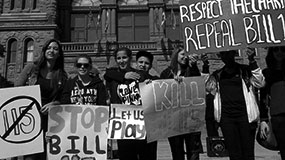
 Two distinct sides have emerged from Bill 115: The Government of Ontario and The Unions. Arthur spoke with CUPE president Fred Hahn to get the Unions side of CUPE’s announcement of a member voted strike.
Two distinct sides have emerged from Bill 115: The Government of Ontario and The Unions. Arthur spoke with CUPE president Fred Hahn to get the Unions side of CUPE’s announcement of a member voted strike.
According to a recent statement, 88 percent of the CUPE membership voted in favor of strike action. It is unclear whether this vote will translate into an actual strike, but when asked about the results Hahn expressed that the vote is indicative of the strong intolerance union members have for legislative interference in the collective bargaining process. “Our member’s goal has always been, and remains, being able to bargain solutions that work for everyone in schools – students, parents, and supportive staff.”
CUPE represents a vast majority of staff whose employment resides in 55,000 schools across Ontario. Custodians, secrtaries, child and youth workers, information technology workers, and library technicians are some of those whose hard work is recognized by Hahn as providing clean, safe and supportive learning environments for students. “[T]hey deserve fairness and respect. That includes having governments respect their rights.”
Although several school boards have completed agreements, those negotiations have primarily been from teachers and fail to address the working reality of the union’s represented support staff. Hahn told Arthur that “a lot of the rhetoric the Liberals have used during this dispute has focused on teachers only and they have ignored the fact that not everyone who works in a school, and not everyone important to student success, is a teacher.”
When challenged with the thought that Bill 115 is being received as an attack on democratic rights even though it is presented as a budget-balancing measure, Hahn noted that unions like CUPE have held collective bargaining rights for generations and that solid agreements have been reached regardless of economic times. Numerous budget options have been proposed by CUPE over the past two years but according to Hahn, Bill 115 is not about the budget. “It is completely wrong-headed, and out-of-sync with our collective history, to think that sacrificing people’s democratic rights has anything to do with the economy. It doesn’t.”
In closing, Hahn reiterated the undemocratic nature of Bill 115, particularly in regards to its sole focus on the education system. Rather than being about the economy, the issue lies with the disregard for a generation-old system of democratic free collective bargaining that benefits all working people. Hahn reminds us that “many of the provisions we take for granted today, like maternity leave, paid vacation time, workplace health and safety, same-sex benefits, and a long list of other things,” which came about because unions first negotiated them for their members. The removal of workers’ rights would ultimately affect us all.
CUPE and the government both have strong, clearly set stances on the topic. However, it is important to note that where the government presents the legislature as an answer to the budget and economy, CUPE answers with the defense of democratic rights. In some ways it seems that the respective sides are engaging in two different conversations: while the government is talking about money, CUPE is concerned about the history of rights. It will be interesting to observe if and how this conversation meets a resolution in the coming months.
